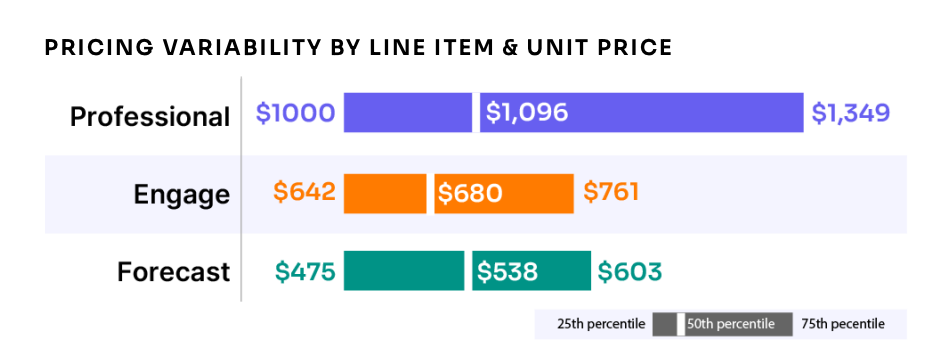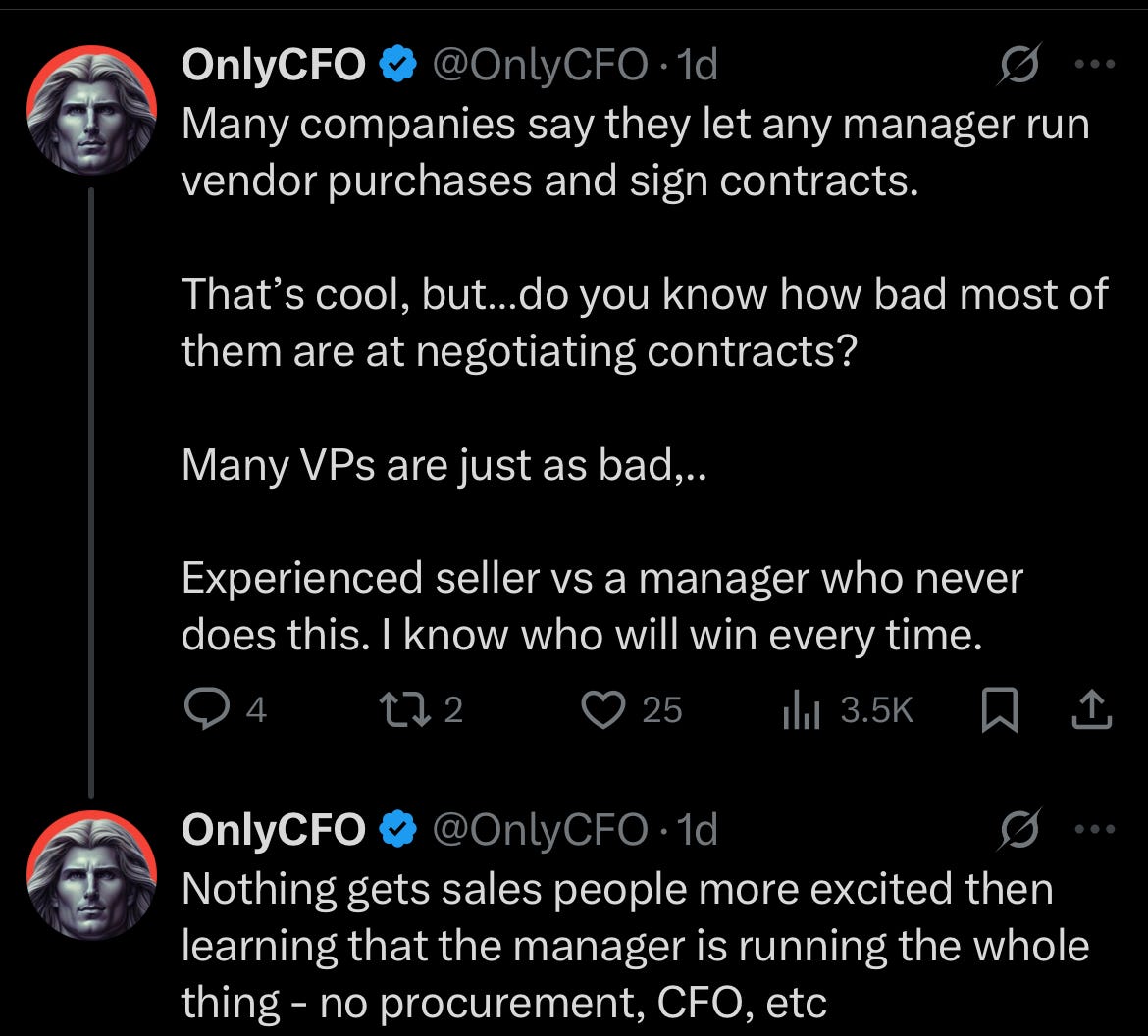Negotiating Vendor Contracts in 2025
How to save money and not get screwed with financial contract terms
Today’s Sponsor: Tropic
Q4 is almost here. And so are the renewals.
Over 30% of SaaS contracts renew in Q4, right in the middle of budgeting season. Tropic’s free Slack, Gong, and HubSpot playbooks give you insider benchmarks, sharp negotiation tips, and contract gotchas from our procurement pros. Two more guides (1Password and ZoomInfo) are on the way. One sign-up gets them all. We’ve already helped customers save $56M in H1. Grab your playbooks and breathe easier this Q4.
Stop Wasting Money!
A lot of money can be saved by simply setting up the right procurement process and having the right people negotiating. Equally (if not more) important…you save a lot of time and headaches on bad contract terms and stupid purchases.
Cloud-related costs (software, infrastructure, AI, etc) are the second largest expense category.
Software costs: ~25%+ of spend
People costs: historically have accounted for ~65% of spend
But AI is also shifting these ratios quickly…If AI is successful at taking more human budgets then an increasingly larger portion of our spend will be tied to cloud-related costs. All the more reason to get these contracts right!
Below is how I approach procurement and the contract terms that can really screw things up.
Negotiating Strategies 101
1. Know Vendor Pricing:
Just knowing pricing benchmarks significantly increases your chances of getting an above average discount. Some vendors have very tight discount bands while others allow a lot more flexibility.
Check around on pricing. There are a lot of ways to get good pricing benchmarks — checking with your network, evaluate multiple competitive tools, spend management tools, etc.
For example, spend management vendors (like Tropic) have price ranges for most software vendors — below is Tropic’s pricing variability data for Gong. Knowing this information gives you a major advantage.
2. Budget is ALWAYS a Concern
Make sure the sales rep knows that budget is a concern or budget is “tight”. I want the buyer champion to blame finance - “Finance says we have a very limited budget and that we are trimming everywhere non-critical”.
Sales rep: So what is the budget?
The answer is always some version of, “All I know is it’s really tight and finance is evaluating everything VERY carefully”.
3. Evaluate Alternatives
Procurement policies often have a requirement of evaluating X number of vendors (like 2-3) before signing a contract for large purchases (e.g. anything >$250K).
If nothing else, you tell all potential vendors that you are evaluating alternatives to make it more competitive. Discounts are almost always larger when they know it’s competitive. But it also helps you figure out what features/functionality might be missing (or you didn’t know to ask about) from a vendor.
4. The End of Quarter/Year Discounts
I hate that this works, but….it does 80%+ of the time. Push negotiations toward the end of the quarter or end of their year and additional discounts almost always magically appear.
“We are offering X hours of free professional services”
“We can offer an end of quarter 5% additional discount to get the deal done”
You can demand a higher discount and it is more frequently granted at the end of a period (quarter/year)
Sales reps are trying to hit quotas and companies need to hit their ARR targets so management loosens the reins on sales reps at the end of quarter/year. If you can wait, then it may make sense.
5. The Right Negotiator
I saved the best advice for last….Don’t put your inexperienced manager that buys software twice a year against an experienced seller. Guess who will win every single time?
Our company wants to give autonomy to everyone so we allow any manager owning the purchase decision to negotiate and sign the contract.
Lots of companies do something like this because they heard some other cool company and they want to treat everyone like “owners” and move fast.
I once saw a Series C company require that all vendor negotiations be done by their CRO. Very unusual, but I know that they saved A LOT of money. He was very good…
Contract Terms to Watch
Contract Term Length:
Yes…the longer the contract term the bigger the discount you can get. But this is increasingly the wrong answer for most vendor contracts today.
I have been doing this for a while and I can confidently say that there are more companies that get burned by doing multi-year contracts than there are those that benefit. And I think that will be 2x as true in 2025 given how fast things are changing in software.
I am not saying all multi-year contracts are bad…
AWS? Yes, often makes sense but make sure you are conservative in your spend estimates
ERP? For a later stage company, it often makes sense to do maybe 2+ years
CRM? I sure don’t want to be implementing CRMs every year. It’s a lot of work.
My general policy is “We do not do multi-year”, especially for first time vendors. There are exceptions, but there should be VERY few.
The 5-10% discount is almost never worth the vendor lock-in unless I am 100% positive we are not moving and can use up the commitment. But I have also seen too many contracts that were signed by previous VPs or managers where they also felt very confident….then they left, someone else replaced them, and the new person doesn’t want the software. Seen this play out too many times….
Auto-renewal:
Negotiate these out. Everyone has been burned by an auto-renewal that accidentally triggers. Sure you can get tracking systems, but the risk is still there
If the vendor refuses to remove auto-renewal? I send an opt-out notice immediately after the contract is signed. Boom!
And guess what? When there is no auto-renewal or you send an opt-out notice really early, the vendor tends to start working with you A LOT earlier for the renewal and you almost always get bigger discounts.
Payment Terms
The more paid upfront the bigger the discount.
I don’t have strong opinions here because every company has different cash management goals, but generally if you have committed to the contract anyways then I am OK paying more upfront to get a larger discount (if you are in a strong cash position). Especially if the discount is larger than the interest rate your money would get by sitting in the bank.
And a bonus of less frequent payments is that there is less paperwork and approvals since there are less invoices.
Pricing Uplifts
You just signed a new contract with an important new vendor — congrats!
12 months later….The vendor says there is a 10% price uplift. You can’t leave now. It would create a ton of work for your time-constrained team so you bite the bullet but the extra 5% discount you got doesn’t feel as good anymore.
Get a pricing uplift cap in the contract. Anything less than 3-5% is great. Try asking for 0% the first year and 3% the second year and let them come back with something else.
Pricing uplifts can be brutal!
Ramping Contracts:
Ramping contracts is where the price increases during the contract as a result of ramping seats, usage, etc.
Sales reps often push this one hard - “Since you are growing, I can get you a much better rate if you lock in the ramping now by buying more seats/usage that start when you expect those to be needed”
I think these deals can make sense for environments of high predictability (larger companies or when the time horizon is shorter). But most companies are anything but predictable more than a couple of months out.
The further out you go out the greater the risk. It’s often not worth the discount.
Other Thoughts
Put an approval process in place. Below is an example of a mid/late-stage company dollar thresholds for approvals. If you have a procurement team, then they should be included fairly early to help with negotiations.
Don’t default renew. Company needs change, better products come to market, etc. Thoughtfully consider if you actually should renew a vendor (zero-based budgeting).
The cost of a tool is NOT just the sticker price. It is often 2x more expensive than just the software. There are implementation costs (external and/or internal) and ongoing maintenance.
Final Thoughts
Don’t put an inexperienced buyer against an experienced seller.
Having the right people in roles at the right time/stage of your company is critical. They will make better decisions, including managing software spend.
Don’t forget to use your brain. With the speed of change in software we can’t solely rely on benchmarks to tell us what to do.
Create a culture of accountability and financial efficiency.
Footnotes:
Get the playbook on how to save on popular vendors like: Slack, Hubspot, 1Password, ZoomInfo, and Gong (from Tropic)
I recently partnered with one of the best in-house tech lawyers I know to launch OnlyLawyer. Subscribe and send to your legal team!







You truly saved the best advice for last. #5 is clutch.
The CRO running procurement reminds me of how Romans would make bridge builders stand under the bridge while they walked across to test its integrity. Incentives!